ADSactly Literature - For the Love of Cult Authors : Jack Kerouac
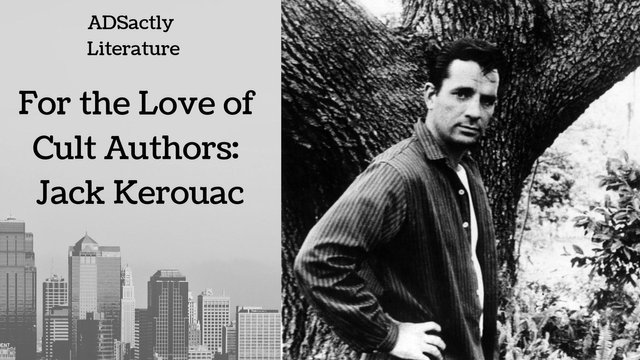
What exactly is a “cult author”? Not someone who writes about cults, certainly, but rather a writer who had (either during his lifetime or posthumously) gathered a cult following – squadrons of rabid fans re-reading his or her books over and over and quoting them to anyone who’s willing to listen.
It’s tricky to define exactly what makes a cult book, but chances are you’ll know when you read one. It’s often something obscure, because our society is obsessed with the strange and quirky. A cult author often comes at ya from the fringes of society, they write about the subcultures, about the downtrodden, about the underground. They represent that world you’d kinda like to inhabit, but are often too scared to do so. And often enough, they become the fascination of a lifetime.
In this new @adsactly series, we’ll be taking a look at several “cult authors” who mesmerize audiences well after their deaths. And first in our line-up of famous writers is none other than Jack Kerouac.
Although today, he has become an emblem of American literature, Jack Kerouac only started learning the English language at the age of six. Being as he was, of Canadian descent, he spent the first few years of his life conversing in French with his family. Throughout his life, Kerouac’s ancestry would be an obsession for Jack, who became convinced they were descendants of a Briton Baron. He often tried to talk up his ancestry and roots, despite the fact the family was, by no means, well-off financially.
Jack Kerouac, although often associated with Buddhism, atheism, drugs and alcohol, was deeply Catholic throughout his life, a religious devotion he inherited from his mother, whom he just adored. Kerouac’s life was deeply shaken in 1926 when his older brother, Gerard, died of rheumatic fever at the tender age of nine.
Jack, who was only four at the time, would be haunted by his dead brother throughout his life, writing of him in Visions of Gerard, and insisting Gerard watched over him, a sort of guardian angel. Kerouac’s links with religion were deep, especially after the death of his brother. He insisted his brother had had a vision of the Virgin Mary before his death. He also claimed that while saying the rosary at age six, Jack himself saw a vision of Jesus Christ, who warned him that although he had a good soul, he would die in great pain and horror (oddly true).
While there are plenty of sources to read up on Kerouac’s life, it’s a difficult sort of research. Mainly because the reality so often becomes intertwined with the myth, to the point where you don’t know if people are telling you how they would’ve liked Kerouac to be or how he actually was.
In this article, we won’t go through a year-to-year biography of the father of the Beat movement (as he is often referred to). That is not the point, and again, there are so many conflicting sources that we might be here all day. But I do want to touch on a few key elements of Jack Kerouac’s life, and then move on to his following and legacy.
One aspect of Kerouac’s youth that is particularly interesting to me is the infamous Kammerer killing, in which Kerouac was arrested and questioned as a material witness.
It can be said that the entire Beat movement coalesced around the central figure of Lucien Carr. As fellow Beat figure Allen Ginsberg later put it, “Lou was the glue”. And Lou was also a very troubled, disturbed young man, by most accounts. He had a strange sense of art and artistic expression and had a bend for the vulgar and obscene. He was often outrageous and regarded as somewhat of a genius.
Yet, Carr’s life never reached the fame of the other Beats.
When Lucien Carr was twelve years old Boy Scout, he met the much older David Kammerer (professor of English and physical education, also friend of William S. Burroughs). According to Carr, Kammerer became obsessed with him and began stalking him, often showing up outside his school and paying almost monomaniacal attention to the boy. It is unclear and much disputed whether the young Car condoned this behavior or not, with many insisting he was sometimes hot and sometimes cold towards the older man.
Kammerer became a fringe figure for the Beat crowd, coming in contact with most of the greats – such as Ginsberg and our very own Kerouac.
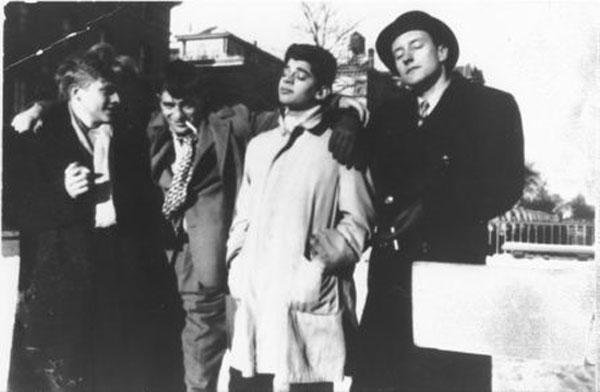
Carr, Kerouac, Ginsberg and Burroughs src
On the 13th of August 1944, Carr stabbed Kammerer to death in Riverside Park after the older man attacked him. He them disposed of the body in the river and went to friend and mentor, William S. Burroughs’ apartment to ask for help. Burroughs flashed Kammerer’s bloodied cigarettes down the toilet and Kerouac, then 23 years old, helped Carr get rid of the murder weapon.
Burroughs and Kerouac were both arrested as witnesses and famously, Jack Kerouac’s father refused to post bail for his son, leaving him in jail. His girlfriend’s parents eventually bailed him out, on the condition Jack would marry their daughter, which he did. Carr served two years.
Although largely disputed, it is a strange, yet fascinating story, as I’m sure you’ll agree.
Kerouac is known for creating the “dream” - in many ways this image of the young friends traveling the country in search of themselves, on a trip fueled by drugs and alcohol, is an ideal for many young people, even today. It’s a dream, a life of adventure, love and fun.
Interestingly, Kerouac’s writing style, that infamous stream of consciousness appears to have been quite different from what we think. Even though he wrote his most famous novel, On The Road, in one sitting, more or less, Kerouac had been plotting it and revising it in his head for years. Therefore, even though we view Kerouac as a spontaneous writer, he really was not.
Kerouac struggled for six years to find a publisher who would take On The Road, which was widely rejected for its explicit depictions of homosexual sex and drug use. Publishers feared the book would result in obscenity charges being filed (apparently, that was a thing then), as it later happened with Ginsberg’s Howl and Burroughs’ Naked Lunch.
Although he continued to describe himself as a devout Catholic, Kerouac’s later years were a downward spiral into alcoholism, which he himself resented. He died at the relatively young age of forty seven, from internal hemorrhage. He received several transfusions, but since his liver was seriously damaged by years of alcohol abuse, the blood refused to clot, causing his childhood premonition of a violent, horrible death to come true.
Legacy
Kerouac continues to be an influence for many young people today. Artists, especially, take great inspiration from the Beat iconoclast. Several artists and now musical icons in their own right, such as Bob Dylan, Patti Smith, The Grateful Dead and Tom Waits, were inspired both by Kerouac’s style and his life.
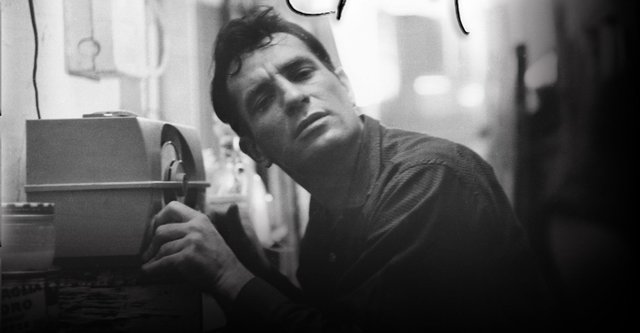
Kerouac listening to himself on the radio src
It is true, he opened the door for many, giving a whole new meaning to the concept of artistic expression. Because, even though his writing was not, as I pointed out, spontaneous and spur of the moment, it certainly gave off that impression, it created this new freewriting style, which many artists later emulated.
The Doors legend, Jim Morrison, quoted Kerouac as one of the band’s greatest influences, which is easy to see in their lyrics.
But something I find even more interesting is the fascination people have with Kerouac. I don’t mean artists here, I mean regular people. Because Kerouac, like many in this series, became a sort of parental figure for the underground, for the misfits and those on the fringes of society. He is one of the many central figures of the counterculture society that has been growing over the past fifty years.
Why? Because Kerouac was someone people could identify with, as were his characters (almost all of them based off real-life friends). They were lost kids, looking for a meaning or, as Kerouac put it, “for God”. Kerouac was and is a really attractive figure because he’s not traditional literature. He never will be. His style is too direct, too weird to ever go mainstream, regardless how many followers On the Road (or his other works) attracts.
And I suppose that’s what makes Kerouac so appealing, even today.
So, @adsactly readers, are you Kerouac fans?
Authored by @honeydue
References: Wiki
Click on the coin to join our Discord Chat

Witness proposal is here:
Go To Steem Witness Page
In the bottom of the page type: adsactly-witness and press vote.

Use small letters and no "@" sign. Or, click here to vote directly!
Thank you!
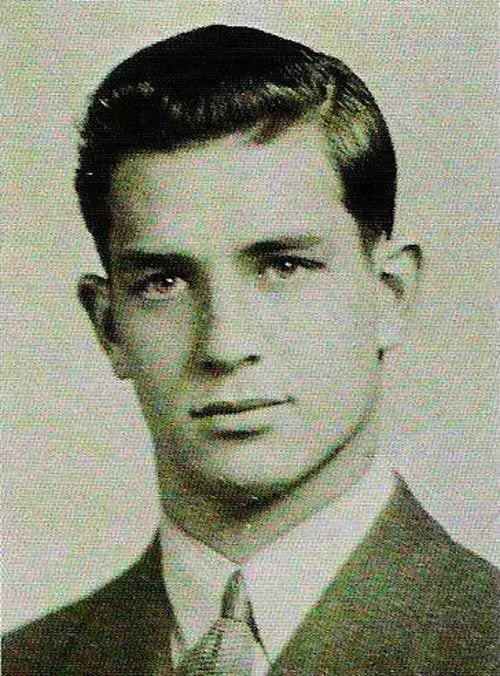
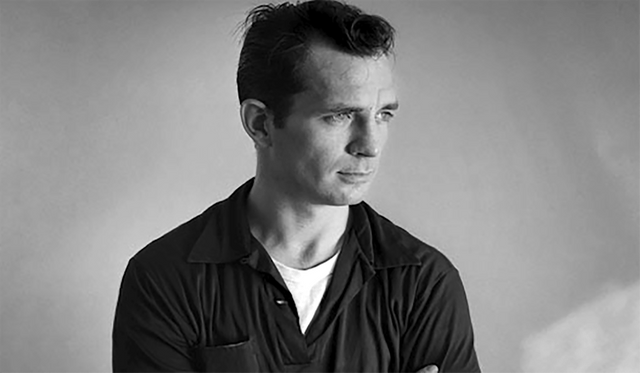
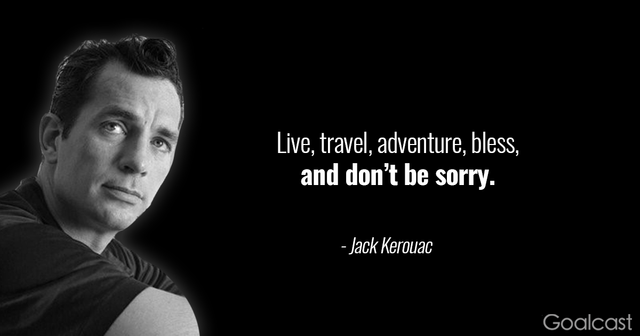
This is a wonderful article on a legendary writer who motivated many young people to get out on the road with his jazzy stream of consciousness prose. He didn't embrace the psychedelic movement that came afterwards, but he was definitely one of the voices that ushered it. My only recommendation to improve this article is to use quotes from his work to showcase why he was such a revolutionary writer. Here is an example from his most famous novel, On the Road:
The only people for me are the mad ones, the ones who are mad to live, mad to talk, mad to be saved, desirous of everything at the same time, the ones who never yawn or say a commonplace thing, but burn, burn, burn like fabulous yellow roman candles exploding like spiders across the stars and in the middle you see the blue centerlight pop and everybody goes “Awww!”
That's a great point (and a great quote!). I guess I got so caught up in writing this that I forgot ;) But will remember it for future installments of the series!
Thank you for reading!
Great post. The Dood's among the cult of Kerouac, huge fan of Ginsberg and Burroughs too. Definitely a wild bunch, crazy to think of these guys all hanging out together and mentoring one another .
Posted using Partiko Android
I know, right? They were all mindblowing :D Thanks for reading!
Interesting Post
When I read this post I remembered that in someone's life it must be full of twists and turns. I see how Jack Kerouac was able to write it in a great work. If everyone can take notes in his life and then tell him, he will certainly be born another Kerouac. However, as one of the central figures in writing in America, Kerouac was able to color and inspire other writers. My interest is how an artist who must have madness in certain fields is able to produce extraordinary works. Like On the road, or other works in the form of prose or poetry can be good reading, especially for young people who are looking for identity. good reading will certainly provide motivation. and reading written from a life note is one of the best teachers as an inspiration.
Thank you @honeydue
Thank you @adsactly
Thank you Steemit
Warm regard from Indonesia
Yes definitely, reading Kerouac will inspire many others, though I don't know if there will be another Kerouac.
Well, I would say the madness helps in a way, though I'm not really sure how it happens either. Thank you for reading!
To listen to the audio version of this article click on the play image.

Brought to you by @tts. If you find it useful please consider upvoting this reply.
Hi, @adsactly!
You just got a 0.38% upvote from SteemPlus!
To get higher upvotes, earn more SteemPlus Points (SPP). On your Steemit wallet, check your SPP balance and click on "How to earn SPP?" to find out all the ways to earn.
If you're not using SteemPlus yet, please check our last posts in here to see the many ways in which SteemPlus can improve your Steem experience on Steemit and Busy.
The initiative to make a series on "cult authors" seems to me excellent, @honeydue. There are those of great interest, certainly. For me a "cult author" is a writer or artist in general who, without being someone of great diffusion or acceptance for the general public, becomes, by the peculiar characteristics (unusual, strange, bold, marginal, unconventional ...) of his work and life, a creator followed perhaps by a select group.
Kerouac, surely, is. I believe that he, along with his other companions of the so-called "beat generation", are heirs to a great figure (very controversial, by the way) of modern literature (by the way, I plan to address it soon in my series on literary modernity): Arthur Rimbaud.
In these authors work and life are confused, and sometimes the second flap to the first. Their lives were very intense and daring, marked by something of what the French collect in the phrase "enfant terrible", or Verlaine "poèts maudits". Kerouac will be attracting the attention of readers, attracted by adventure and transgression, thank you for your good work both in the text and in the illustrations that accompany it. Greetings.
This series is very interesting and this post is very complete and very well illustrated! There are so many cult writers to talk about. It has to be said that these writers, just as they were inspiration for writers and young people, also found inspiration in authors. In the case of Kerouac, he is said to have read poets such as Walt Whitman, Arthur Rimbaud, novelists such as Henry Miller and James Joyce, and thinkers such as David Thoureau. It is also said that one of his greatest influences when writing came from jazz musicians such as Charlie Parker. In fact, this writing technique called spontaneous prose is said to emulate bebop jazz rhythm.
It will be interesting to read this series, @honeydue.
Definetely one of my favourite writers!